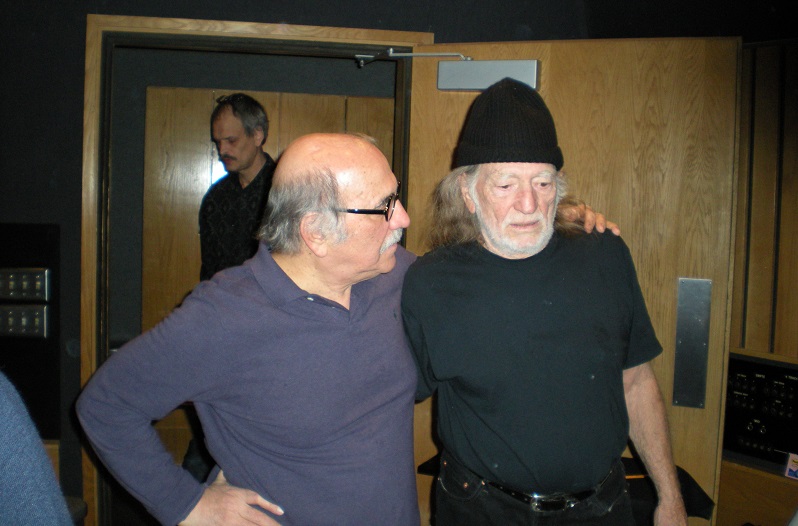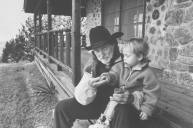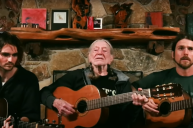Jazz shapes the music of Willie Nelson, from his long-established appreciation for guitarist Django Reinhardt to his albums of standards. Those albums go beyond Stardust and include American Classic, a jazz-heavy 2009 collection produced by Tommy LiPuma.
American Classic included a re-recording of Nelson's "Always on My Mind" plus duets with Diana Krall and Norah Jones. Any collection of older songs reinterpreted by Nelson hits the spot, be it this album or the following year's roots music survey Country Music.
As for LiPuma, the Cleveland, Ohio native won five Grammy awards while working with the likes of Miles Davis, George Benson, Al Jarreau, Barbra Streisand, Paul McCartney, Dave Mason, the Sandpipers, Natalie Cole, the O'Jays, Randy Newman, Leon Russell and Dr. John.
LiPuma, who passed away in 2017 at age 80, is the subject of jazz musician Ben Sidran's recent book The Ballad of Tommy LiPuma.
"His experience encapsulates the modern recording industry," Sidran says of LiPuma in a press release. "You can see the evolution of the way music was captured and recorded and distributed, how it evolved, and the impact of the technologies and the marketing strategies. You can read his story and get all that information just because of who he was and where he was, at exactly the right time."
Read More: Willie Nelson Covers 'I'm The Only Hell My Mama Ever Raised' For New Album
Sidran's celebration of an American music master, released on May 5 by Nardis Books, includes the following excerpt about LiPuma's working relationship with Nelson. As you might suspect, it's part musical history lesson, part tale about smoking weed with Willie.
Willie Nelson and Tommy LiPuma, from The Ballad of Tommy LiPuma
Bruce Lundvall, the president of Blue Note Records, asked Tommy if he was interested in doing an album with Willie Nelson. "I loved Willie's standards album," says Tommy, "and my first thought was to use Joe Sample—like Willie, Joe is from Texas—so Joe and I went to Austin to spend a day at Willie's ranch. How shall I put this? It's a place of ultimate highness. It's not like it's over the top, but every so often, Willie's got this smoking contraption that's on a stand and he fires it up. Willie is high most of the day and into the night.
"We spent a whole day going through tunes. He was right there with us, and he was just great. He has a real 'standards' aesthetic. He really knows this stuff upside down, backwards and forwards.
"And at one point, when we had gone through all the tunes, he said, 'Come on, lemme show you around the ranch.' Willie's got several hundred acres; there's what looks like a Hollywood set on the property. We got into his truck and the first stop we made was this little church that looked like it was right out of the 1880s, pews and all. Then we got back in the truck and we ended up at what looked like a Western town, with a saloon with swinging doors, the whole thing. We went in and there were all his pals sitting around drinking beer.
"He's got a lot of very interesting buddies. Not just the guys who were there drinking beer. At one point, I got thirsty and I said, 'You got any water back there?' He said, 'Right over there,' so I took a glass, and man the water tasted great! I made a remark, because there was no bottle on top of it, like at a water cooler, it was just coming from a pipe straight out of the wall. I said, 'Is this your tap water?' and he said a friend of his invented this thing that grabs the moisture out of the atmosphere and turns it into pure drinking water. Willie's got some hip friends."
A few months later, Willie, Tommy, and Joe all met up in New York at Right Track Studios, where they had a big studio for the band and a nice little isolation booth for Willie. Willie's booth was connected directly to the control room, and of course wherever Willie goes, his pipe goes with him. You couldn't enter the vocal booth unless you were willing to have an attitude adjustment.
Willie had parked his tour bus in front of the studio on Forty- eighth Street, and when he wasn't recording, he would hang out there. He also slept on the bus. After a couple of days, somebody called Tommy and said, "Check out page six." Tommy opened the 'Daily News' and read, "Willie Nelson is apparently in town recording an album at a studio on 48th Street. You can tell from the wafts of smoke coming out of this bus as you walk down the street.'" Pretty soon, Tommy was hanging out on the bus too, using Willie's sound system to check out the recordings. By the recording's conclusion, Tommy and Willie were like two old shoes.




